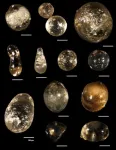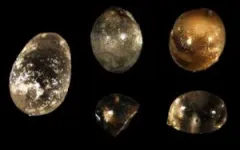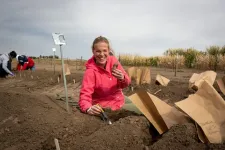(Press-News.org) Two massive asteroids hit Earth around 35.65 million years ago, but did not lead to any lasting changes in the Earth’s climate, according to a new study by UCL researchers.
The rocks, both several miles wide, hit Earth about 25,000 years apart, leaving the 60-mile (100km) Popigai crater in Siberia, Russia, and the 25-55 mile (40-85km) crater in the Chesapeake Bay, in the United States - the fourth and fifth largest known asteroid craters on Earth.
The new study, published in the journal Communications Earth & Environment, found no evidence of a lasting shift in climate in the 150,000 years that followed the impacts.
The researchers inferred the past climate by looking at isotopes (atom types) in the fossils of tiny, shelled organisms that lived in the sea or on the seafloor at the time. The pattern of isotopes reflects how warm the waters were when the organisms were alive.
Co-author Professor Bridget Wade (UCL Earth Sciences) said: “What is remarkable about our results is that there was no real change following the impacts. We expected the isotopes to shift in one direction or another, indicating warmer or cooler waters, but this did not happen. These large asteroid impacts occurred and, over the long term, our planet seemed to carry on as usual.
“However, our study would not have picked up shorter-term changes over tens or hundreds of years, as the samples were every 11,000 years. Over a human time scale, these asteroid impacts would be a disaster. They would create a massive shockwave and tsunami, there would be widespread fires, and large amounts of dust would be sent into the air, blocking out sunlight.
“Modelling studies of the larger Chicxulub impact, which killed off the dinosaurs, also suggest a shift in climate on a much smaller time scale of less than 25 years.
“So we still need to know what is coming and fund missions to prevent future collisions.”
The research team, including Professor Wade and MSc Geosciences student Natalie Cheng, analysed isotopes in over 1,500 fossils of single-celled organisms called foraminifera, both those that lived close to the surface of the ocean (planktonic foraminifera) and on the seafloor (benthic foraminifera).
These fossils ranged from 35.5 to 35.9 million years old and were found embedded within three metres of a rock core taken from underneath the Gulf of Mexico by the scientific Deep Sea Drilling Project.
The two major asteroids that hit during that time have been estimated to be 3-5 miles (5-8km) and 2-3 miles (3-5km) wide. The larger of the two, which created the Popigai crater, was about as wide as Everest is tall.
In addition to these two impacts, existing evidence suggests three smaller asteroids also hit Earth during this time – the late Eocene epoch – pointing to a disturbance in our solar system’s asteroid belt.
Previous investigations into the climate of the time had been inconclusive, the researchers noted, with some linking the asteroid impacts with accelerated cooling and others with episodes of warmer temperatures.
However, these studies were conducted at lower resolution, looking at samples at greater intervals than 11,000 years, and their analysis was more limited – for instance, only looking at species of benthic foraminifera that lived on the seafloor.
By using fossils that lived at different ocean depths, the new study provides a more complete picture of how the oceans responded to the impact events.
The researchers looked at carbon and oxygen isotopes in multiple species of planktonic and benthic foraminifera.
They found shifts in isotopes about 100,000 years prior to the two asteroid impacts, suggesting a warming of about 2 degrees C in the surface ocean and a 1 degree C cooling in deep water. But no shifts were found around the time of the impacts or afterwards.
Within the rock, the researchers also found evidence of the two major impacts in the form of thousands of tiny droplets of glass, or silica. These form after silica-containing rocks get vaporised by an asteroid. The silica end up in the atmosphere, but solidify into droplets as they cool.
Co-author and MSc Geosciences graduate Natalie Cheng said: “Given that the Chicxulub impact likely led to a major extinction event, we were curious to investigate whether what appeared as a series of sizeable asteroid impacts during the Eocene also caused long-lasting climate changes. We were surprised to discover that there were no significant climate responses to these impacts.
“It was fascinating to read Earth's climate history from the chemistry preserved in microfossils. It was especially interesting to work with our selection of foraminifera species and discover beautiful specimens of microspherules along the way.”
The study received funding from the UK’s Natural Environment Research Council (NERC).
END
Massive asteroid impacts did not change Earth’s climate in the long term
2024-12-04
ELSE PRESS RELEASES FROM THIS DATE:
Milestone in defining electrical units
2024-12-04
The precise measurement of electrical resistance is essential in industrial production or electronics – for example, in the manufacture of high-tech sensors, microchips and flight controls. “Very precise measurements are essential here, as even the smallest deviations can significantly affect these complex systems”, explains Professor Charles Gould, a physicist at the Institute for Topological Insulators at the University of Würzburg (JMU).
The scientist now for the first time have experimentally implemented a so-called quantum resistance standard that can operate without an externally applied magnetic field. “In physics, ...
70% of young people with long Covid recover within two years
2024-12-04
Most young people who were confirmed to have long Covid three months after a positive PCR test had recovered within 24 months, finds a new study led by UCL researchers.
The Children and young people with Long Covid (CLoCK) study, published in Nature Communications Medicine and funded by the National Institute for Health and Care Research (NIHR), is the world’s largest longitudinal cohort study on long Covid in children.
The researchers, led by Professor Sir Terence Stephenson and Professor Roz Shafran (both UCL Great Ormond Street ...
A new catalyst can turn methane into something useful
2024-12-04
CAMBRIDGE, MA -- Although it is less abundant than carbon dioxide, methane gas contributes disproportionately to global warming because it traps more heat in the atmosphere than carbon dioxide, due to its molecular structure.
MIT chemical engineers have now designed a new catalyst that can convert methane into useful polymers, which could help reduce greenhouse gas emissions.
“What to do with methane has been a longstanding problem,” says Michael Strano, the Carbon P. Dubbs Professor of Chemical Engineering at MIT and the senior author of the study. “It’s a source of carbon, and we want to keep it out ...
Climate-ready crop
2024-12-04
A team from the University of Illinois has engineered potato to be more resilient to global warming showing 30% increases in tuber mass under heatwave conditions. This adaptation may provide greater food security for families dependent on potatoes, as these are often the same areas where the changing climate has already affected multiple crop seasons.
“We need to produce crops that can withstand more frequent and intense heatwave events if we are going to meet the population’s need for food in regions most at ...
The heart has its own ‘brain’
2024-12-04
New research from Karolinska Institutet and Columbia University shows that the heart has a mini-brain – its own nervous system that controls the heartbeat. A better understanding of this system, which is much more diverse and complex than previously thought, could lead to new treatments for heart diseases. The study, conducted on zebrafish, is published in Nature Communications.
The heart has long been thought to be controlled solely by the autonomic nervous system, which transmits signals from the brain. The heart’s neural network, which is embedded in the superficial layers of the heart wall, has been considered a simple structure that relays the signals from the ...
Mexican American women less likely to take stroke prevention medications as prescribed
2024-12-04
Research Highlights:
An analysis of more than 1,300 stroke survivors found that women were less likely than their male counterparts to take medications, such as cholesterol-lowering statins and blood thinning medications to prevent blood clots, to prevent recurrent strokes, as prescribed.
Mexican American women were three times more likely to report not taking cholesterol-lowering medications as prescribed than Mexican American men in the study.
Women who were older or married were also more likely to miss taking prescribed doses. Researchers suggest ...
20th century lead exposure damaged American mental health
2024-12-04
DURHAM, N.C. -- In 1923, lead was first added to gasoline to help keep car engines healthy. However, automotive health came at the great expense of our own well-being.
A new study calculates that exposure to car exhaust from leaded gas during childhood altered the balance of mental health in the U.S. population, making generations of Americans more depressed, anxious and inattentive or hyperactive. The research estimates that 151 million cases of psychiatric disorder over the past 75 years have resulted from American children’s exposure to lead.
The findings, from Aaron Reuben, a postdoctoral scholar in neuropsychology ...
Has childhood exposure to lead in gasoline contributed to mental illness?
2024-12-04
New research published in the Journal of Child Psychology and Psychiatry indicates that childhood lead exposure, which peaked from 1960 through 1990 in most industrialized countries due to the use of lead in gasoline, has negatively impacted mental health and likely caused many cases of mental illness and altered personality.
For the study, investigators combined blood–lead level data from National Health and Nutrition Examination Surveys with historic leaded gasoline data. (Leaded gas was phased out in United States by 1996.) They estimated US childhood blood–lead levels from 1940 to 2015 and assessed ...
Study explores race and ethnicity dynamics in survival in the United States after people reach their mid-80s and beyond
2024-12-04
Though African Americans have higher death rates before their 80s, after about age 85, their age-specific death rate falls below that of the white population, a phenomenon known as the "Black-White mortality crossover." New research published in the Journal of Internal Medicine reveals that this lower mortality among African Americans persists to age 100+ years.
The study relied on data adjusted for potential misreporting of age, race, and ethnicity from the US National Center for Health Statistics to obtain life expectancy ...
Do soil microbes affect flowers’ ability to attract bees?
2024-12-04
New research reveals that certain soil microbes can help plants grow bigger flowers, therefore attracting more bees. The findings, which are published in New Phytologist, suggest that studying roots’ relationships with microbes can help scientists predict floral trait variations and plant-pollinator interactions.
The research focused on arbuscular mycorrhizal fungi (AMF), which form a symbiotic relationship with plant roots, providing the plant with nutrients and water in exchange for carbon. AMF associations with plants’ roots enhanced flower size, resulting in more visitations ...



